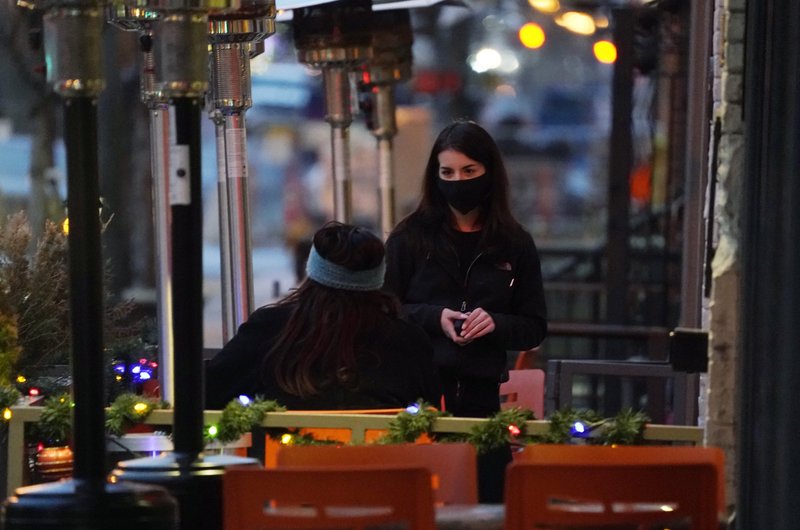The London and Middlesex region has officially left the red zone and entered the orange zone of Ontario’s COVID-19 response framework.

This means an increase in gathering sizes, and more patrons are allowed at restaurants and bars as well as sports facilities.
Family Circle Restaurant, a family-owned brunch spot, is looking forward to entering the less restrictive orange zone.
“We’re very relieved,” manager Daniel Letsos told 980 CFPL.
“We (can) seat about 135 people, so being able to serve more than 10 people is going to be a lot more helpful for us.”
Ontario entered a provincewide lockdown starting Dec. 26 that lasted until Feb. 16 for the London and Middlesex region. That’s when the region entered the red zone.
Letsos says going from lockdown to red and now orange means the restaurant had to find new ways to reach their customers to keep their business running.

“We’ve been mostly doing Uber Eats and Skip the Dishes because that’s the only thing we can do to keep afloat, but (the two companies) also do take quite a big percentage (of earnings) like 20 or 30 per cent depending on the service.”
The manager says the restaurant is looking forward to welcoming up to 50 diners inside instead of 10, which was the maximum in the red zone.
“Last weekend, we had 10 people (inside) and we had to turn away at least 15 tables because we had a line-up outside and people didn’t want to wait.”
Tom Sada, the owner of all five Chuck’s Roadhouse Bar & Grill locations in London says his restaurants also had to turn away customers regularly when the region was in red.

Get daily National news
“We used to have people wait in their car in the parking lot for (someone) to leave so they could come in,” he said. “So hopefully with orange, we (won’t) have to turn as many people away.”
The owner is looking forward to the region possibly moving into the yellow zone soon and eventually green, which allows bars to open a few hours longer into the evening.
“Yellow allows (us) to open until 11 p.m., but orange, you’re only allowed (to open) until 9 p.m.”
The move also means Sada can bring back 30 per cent of his 360 staff members.

For London’s BMO Centre, the move to orange means the indoor sports field can finally reopen after being closed for two and a half months since Dec. 13.
“It’ll be very exciting to see the kids come back into the centre (for) soccer practice,” said Tom Partalas, the president of the centre.
BMO Centre originally planned to reopen when the region entered the red zone in mid February, but it was only permitted 10 people on the main field and another 10 people on the expansion field.
“It’s not feasible for us to open the doors because it costs a lot of money to run the facility,” Partalas told 980 CFPL in a previous interview.
- More than half of small businesses say U.S. no longer reliable: CFIB data
- The Bank of Canada says these are the 3 warning signs for mortgage default
- Carney says Canadian military participation in Middle East war can’t be ruled out
- Canadians want floor-crossing MPs to face ‘immediate’ byelections: poll
Starting Monday, up to 50 people will be allowed inside the centre. Partalas says most visitors will be children training for soccer.
“Some of them can hardly wait. They’ve already called us and they’re ready to come back (and) train.”
If the region goes back to the red zone in the future, the centre’s president says BMO Centre will close again.
“Hopefully we’ll stay in orange (and) move to yellow then green.”
Dr. Chris Mackie, the medical officer of health with the Middlesex-London Health Unit, said Friday that more people are allowed to gather once the region enters the orange zone.
“Indoor gathering limits are now up to (10) indoors, 25 outdoors.”
He also explained why London and Middlesex didn’t make it into the yellow zone, despite the region’s consistently low daily case counts.
“When people get the signal that everything is fine, the behaviours tend to go to the level of indoor interactions that really can accelerate cases,” he said.
The move from red to orange came into effect at 12:01 a.m. Monday, March 1.
Orange-restrict can be assigned to regions with weekly incidence rates of 25 to 39.9 per 100,000 cases while red-restrict can be assigned to regions with weekly incidence rates of 40 per 100,000 or more.
Other factors such as percent positivity, repeated outbreaks and hospital and ICU capacity are also considered.
In terms of regions near London and Middlesex, Elgin-Oxford will move to the orange zone, Huron-Perth will move to yellow and Lambton County is staying in red for another week.












Comments
Want to discuss? Please read our Commenting Policy first.